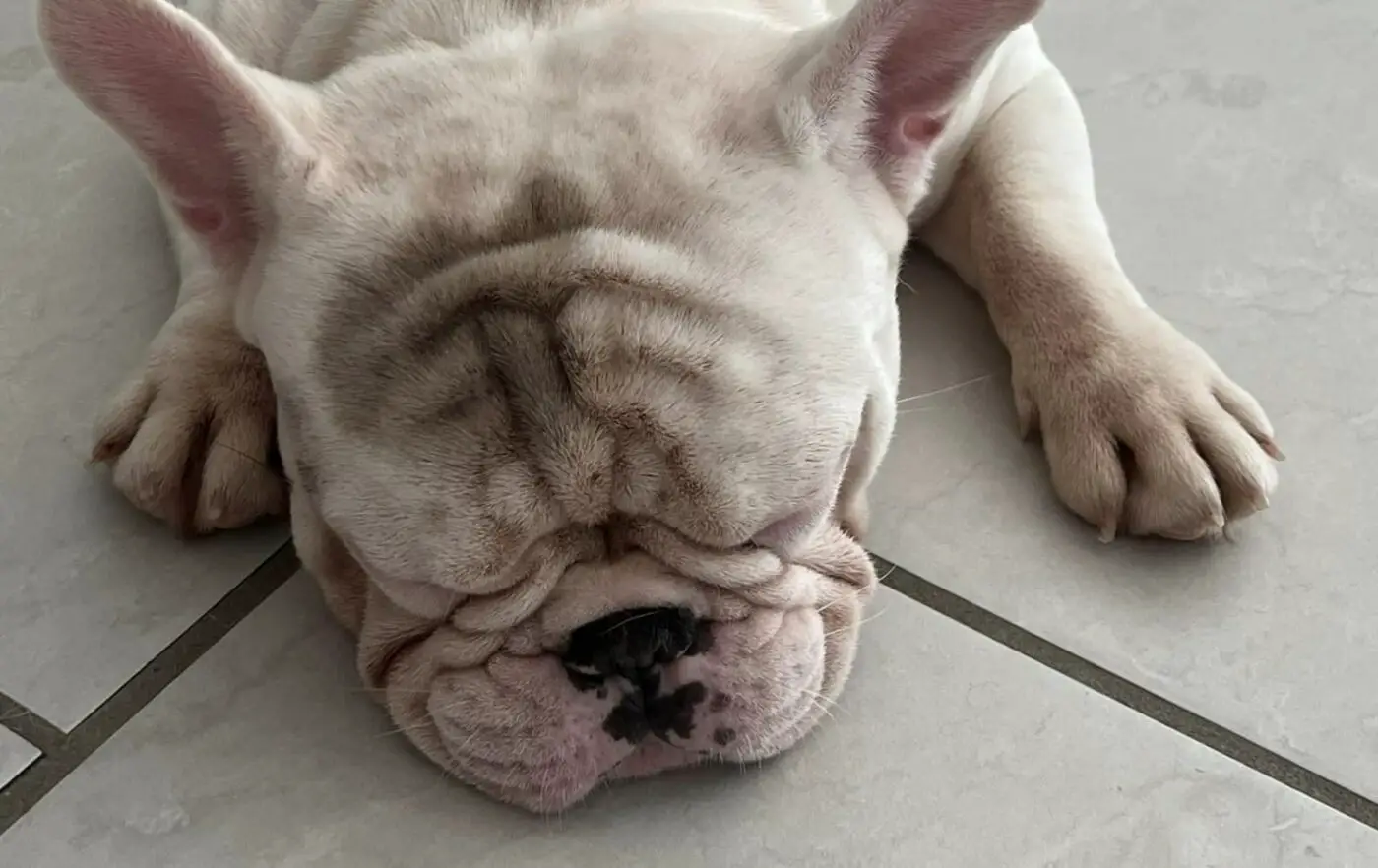French Bulldogs, with their adorable flat faces and expressive eyes, are a beloved breed around the world.
However, these unique physical characteristics also predispose them to certain health issues, notably breathing problems.
Research indicates that as many as 66% of French Bulldogs may experience some form of respiratory distress due to their brachycephalic nature.
These breathing problems can range from mild symptoms like loud, heavy breathing and snoring, to severe complications like oxygen starvation.
While these issues are unfortunately common, understanding them is the first step towards managing them effectively and ensuring your Frenchie leads a comfortable and fulfilling life.
- Do French Bulldogs Have Breathing Problems?
- Common Breathing Problems In French Bulldogs
- Causes of Breathing Problems In French Bulldogs
- Symptoms of Breathing Problems In French Bulldogs
- Diagnosis of Breathing Problems in French Bulldogs
- Treatment Options For Breathing Problems In French Bulldogs
- Prevention of Breathing Problems in French Bulldogs
- Living With a French Bulldog With Breathing Problems
Do French Bulldogs Have Breathing Problems?

French Bulldogs often experience breathing problems due to their brachycephalic nature, which is characterized by a shortened skull shape leading to a compressed upper respiratory system.
Breathing issues in French Bulldogs are common and can range from moderate to severe. These dogs are known for their loud, heavy breathing, and many of them snore.
Research indicates that as much as 66% of French Bulldogs have some form of breathing problem, which is largely due to their unique physical structure.
From my years of experience as a veterinarian, I’ve seen firsthand the impact of these issues on French Bulldogs.
Many times, they can become easily winded or have difficulty keeping up with other dogs due to their restricted airways. This is something prospective owners should be aware of, as it affects the breed’s overall activity level and quality of life.
It’s not unusual for a Frenchie to work themselves up into a frenzy during play or excitement, which can further exacerbate their breathing difficulties.
In fact, some of the cases I’ve encountered required surgical intervention to alleviate these problems, especially for those suffering from brachycephalic obstructive airway syndrome (BOAS).
That said, not all French Bulldogs will experience these issues to the same degree. Factors like the dog’s overall health, weight, and specific physical characteristics can influence the severity of their breathing problems.
Despite these challenges, with proper care and regular check-ups, French Bulldogs can lead happy, fulfilling lives.
Common Breathing Problems In French Bulldogs

Common breathing problems in French Bulldogs often stem from their brachycephalic nature, which results in a compacted upper respiratory system.
These issues can range from moderate to severe and can significantly affect the quality of life of these adorable companions.
Brachycephalic Airway Syndrome (BAS)
Brachycephalic Airway Syndrome (BAS) is a prevalent condition among French Bulldogs. It’s characterized by various anatomical abnormalities such as narrowed nostrils, an elongated soft palate, and sometimes, a hypoplastic trachea.
These physical features can restrict airflow, leading to symptoms like heavy panting, snoring, and difficulty in drawing in air.
As a veterinarian, I’ve treated numerous Frenchies with BAS. Some cases required surgical intervention to alleviate the obstruction and improve the dog’s overall breathing capacity.
Post-surgery, many of these dogs showed significant improvements in their activity levels and overall quality of life.
Allergies and Infections
Allergies and infections can also cause respiratory distress in French Bulldogs. These can lead to inflammation in the airways, further exacerbating the breathing problems inherent to the breed.
Common signs include:
- Coughing
- Wheezing
- Increased mucus production
In my practice, I’ve seen French Bulldogs respond well to treatments that include antihistamines for allergies and antibiotics for infections.
However, it’s crucial to consult with a vet to determine the best course of action based on the individual dog’s health condition.
Obesity
Obesity is another common cause of breathing problems in French Bulldogs says Pet Place. Excess weight puts additional pressure on the respiratory system, making it even harder for these dogs to breathe.
In such cases, a carefully managed diet and exercise plan can make a world of difference. During my years in veterinary practice, I’ve helped many French Bulldogs achieve a healthier weight, resulting in noticeable improvements in their breathing and overall well-being.
Structural Abnormalities
Sometimes, structural abnormalities such as stenotic nares or “pinched nose” can contribute to breathing problems in French Bulldogs. These issues may require surgical correction to improve airflow says Journals.
Causes of Breathing Problems In French Bulldogs

Causes of breathing problems in French Bulldogs primarily stem from their brachycephalic nature, a term that refers to their characteristic short snout and compressed upper respiratory system.
These issues can manifest in various ways, each requiring different approaches for management and treatment.
Brachycephalic Obstructive Airway Syndrome (BOAS)
One of the main causes of breathing difficulties in French Bulldogs is Brachycephalic Obstructive Airway Syndrome (BOAS).
This condition results from abnormalities in the breed’s anatomical structure, which include narrowed nostrils, an elongated soft palate, and in some cases, a hypoplastic trachea. Symptoms typically include exercise intolerance, noisy breathing, snoring, and wheezing.
In my veterinary practice, I’ve treated a number of French Bulldogs with BOAS. Surgical intervention is often necessary to alleviate these symptoms and improve the dogs’ overall quality of life.
Allergies and Infections
Allergies and infections can also lead to respiratory distress in French Bulldogs. Environmental allergens, food allergies, or infections can cause inflammation in the airways, further compounding their inherent breathing difficulties.
Coughing, wheezing, and increased mucus production are common signs of such issues.
I’ve found that treatments like antihistamines for allergies and antibiotics for infections can be quite effective in these cases. However, each dog’s situation is unique, so it’s essential to have a vet determine the best course of action.
Obesity
Obesity is another significant factor contributing to breathing problems in French Bulldogs. Excess weight puts additional strain on the respiratory system, making it even harder for these dogs to breathe normally.
In my experience, a carefully monitored diet and moderate exercise plan can help manage a Frenchie’s weight and significantly improve their respiratory health.
Structural Abnormalities
Structural abnormalities such as stenotic nares, or a “pinched nose”, can further contribute to breathing problems in French Bulldogs. These issues often require surgical correction to enhance airflow and ease respiratory distress.
Symptoms of Breathing Problems In French Bulldogs

Symptoms of breathing problems in French Bulldogs can vary, but they generally include heavy panting, snoring, wheezing, and exercise intolerance due to their inherent brachycephalic nature.
Heavy Panting
Heavy panting is a common symptom of respiratory distress in French Bulldogs. This can occur even at rest, and not just after physical activity. If you notice your Frenchie panting heavily without a clear reason like heat or exercise, it might be a sign of a breathing problem.
Exercise Intolerance
Exercise intolerance is another key symptom related to breathing problems in French Bulldogs. You might notice your Frenchie getting tired quickly during walks or play sessions. They may also struggle to keep up with other dogs or show a general lack of enthusiasm for physical activities.
As a vet, helping owners understand their pet’s limitations and adapt their exercise routines has been an important part of managing this symptom.
Noisy Breathing and Snoring
Noisy breathing and snoring are also common signs of respiratory issues in French Bulldogs. These sounds can be caused by obstructions or abnormalities in the airways, which make it hard for the dog to breathe normally.
In my practice, I’ve often used these symptoms as clues to diagnose conditions like BOAS. While some level of noise can be normal for this breed, excessively loud or labored breathing often indicates a problem.
Cyanosis
In severe cases where a French Bulldog is struggling to get enough oxygen, the membranes of their mouth and tongue may appear blue or purple, a condition known as cyanosis. This is a serious symptom that requires immediate veterinary attention.
Gastrointestinal Issues
Some French Bulldogs with breathing problems may also show issues with their gastrointestinal system, such as regurgitation, vomiting, or coughing up foamy saliva. This can be due to the strain that respiratory distress puts on the body.
Diagnosis of Breathing Problems in French Bulldogs

Diagnosis of breathing problems in French Bulldogs involves careful observation of symptoms, a thorough physical examination, and specific diagnostic tests to identify the exact nature and severity of the issue.
Observation of Symptoms
Observation of symptoms is often the first step in diagnosing breathing problems in French Bulldogs. This includes noting any abnormal breathing patterns or noises, exercise intolerance, and other signs of respiratory distress.
In my years as a vet, I’ve had numerous consultations where owners have reported their Frenchie snoring loudly, panting heavily even at rest, or lagging behind during walks. These observations are invaluable in identifying potential breathing issues early on.
Physical Examination
A physical examination is essential for diagnosing breathing problems in French Bulldogs.
During this examination, vets listen for rasping or high-pitched sounds when the dog breathes, which could indicate conditions like Brachycephalic Obstructive Airway Syndrome (BOAS).
Additionally, vets check for physical symptoms such as blue or purple membranes in the mouth (cyanosis), which signals a severe lack of oxygen.
Diagnostic Tests
Diagnostic tests play a crucial role in confirming the diagnosis and assessing the severity of the breathing problem. These might include X-rays to check for structural abnormalities in the airways, and blood tests to rule out underlying conditions that could exacerbate breathing problems.
During my time in practice, these tests have been instrumental in providing a clear picture of the dog’s condition and guiding the treatment plan.
For instance, I recall a case where an X-ray revealed a severely elongated soft palate in a Frenchie, which was causing significant respiratory distress. The findings led us to opt for surgical intervention, which greatly improved the dog’s quality of life.
Monitoring Response to Treatment
Once a diagnosis has been made and treatment initiated, monitoring Frenchie’s response to treatment is vital. Improvement in symptoms, enhanced activity levels, and changes in behavior can all indicate whether the treatment is working or if adjustments are needed.
Treatment Options For Breathing Problems In French Bulldogs
Treatment options for breathing problems in French Bulldogs can range from lifestyle changes and medications to surgical interventions, depending on the severity of the issue.
Lifestyle Changes
Lifestyle changes are often the first line of treatment for French Bulldogs with breathing problems. This can include weight management, avoiding overheated or humid environments, and limiting strenuous exercise. These modifications can help reduce stress on the dog’s respiratory system and mitigate symptoms says WikiHow.
In my practice, I’ve worked with numerous Frenchie owners to implement these changes. For instance, switching to a lower-calorie diet and introducing gentle exercise routines have helped many high-weight Frenchies lose weight and subsequently breathe easier.
Medications
Medications such as cough suppressants, bronchodilators, expectorants, and decongestants can also be used to manage symptoms of respiratory distress in French Bulldogs. The choice of medication would depend on the specific symptoms and underlying cause of the breathing problem.
Surgical Interventions
For more severe cases, surgical intervention might be necessary. These procedures can correct structural abnormalities that contribute to breathing difficulties. For instance, a staphylectomy can shorten an elongated soft palate, and nostril widening can improve airflow.
As a vet, I’ve seen the significant difference surgical interventions can make in the lives of French Bulldogs with severe breathing issues.
One particularly memorable case involved a young Frenchie with severely pinched nostrils. After a nostril widening procedure, the improvement in the dog’s breathing was immediate and dramatic, greatly enhancing its quality of life.
Innovative Approaches
Innovative approaches, such as minimally invasive procedures, are also being explored to help French Bulldogs with breathing problems. These techniques aim to achieve the same results as traditional surgery but with less discomfort and faster recovery times for the dog.
Prevention of Breathing Problems in French Bulldogs
Prevention of breathing problems in French Bulldogs involves a mix of careful breeding, appropriate care and lifestyle management, and regular veterinary check-ups.
Careful Breeding
Careful breeding is the first step towards preventing breathing problems in French Bulldogs. By selecting parents with less exaggerated brachycephalic features, breeders can produce puppies that are less likely to develop severe respiratory issues says The Guardian.
As a vet, I often advise potential Frenchie owners to research reputable breeders who prioritize health over appearance when choosing their breeding stock.
Appropriate Care and Lifestyle Management
Appropriate care and lifestyle management are also crucial in preventing breathing problems in French Bulldogs.
This includes keeping your Frenchie at a healthy weight, as obesity can exacerbate breathing difficulties. Avoiding extreme temperatures and strenuous exercise, especially in hot or humid conditions, can also help prevent respiratory distress.
In my practice, I’ve seen many French Bulldogs benefit from these lifestyle modifications. For example, one of my patients, a delightful Frenchie named Bella, had recurrent breathing issues exacerbated by her weight.
With the right diet and a tailored exercise plan, Bella was able to shed the extra pounds, which significantly improved her breathing and overall quality of life.
Regular Veterinary Check-ups
Regular veterinary check-ups are essential for early detection and prevention of breathing problems in French Bulldogs. During these visits, your vet can monitor your Frenchie’s respiratory health and provide advice or treatment as needed.
Use of Harness Instead of Collar
Using a harness instead of a collar can also be beneficial in preventing breathing problems in French Bulldogs. A collar can put pressure on the throat and further restrict airflow, while a harness distributes the pressure more evenly across the body.
Surgical Interventions
In some cases, surgical interventions may be considered as a preventive measure for breathing problems in French Bulldogs. These procedures, such as nostril widening or palate shortening, can improve airflow and prevent the development of more severe respiratory issues.
Living With a French Bulldog With Breathing Problems
Living with a French Bulldog with breathing problems can be challenging but manageable, with the right knowledge, care, and support.
Providing Appropriate Care
Providing appropriate care for your Frenchie is essential. This includes maintaining a healthy weight, as obesity can worsen breathing problems, and avoiding strenuous exercise, particularly in hot or humid conditions.
Additionally, using a harness instead of a collar can prevent pressure on the throat that can restrict breathing further.
One of my most memorable patients was a Frenchie named Max. His owner was diligent about maintaining his weight and carefully managing his exercise, which significantly helped manage his breathing issues.
Regular Veterinary Visits
Regular veterinary visits are key to managing your Frenchie’s breathing problems. Your vet can monitor your dog’s condition, adjust treatment plans as needed, and provide advice and support.
Surgical Interventions
In some cases, surgical interventions may be necessary to alleviate severe breathing problems. Procedures such as nostril widening or palate shortening can greatly improve your Frenchie’s quality of life.
Emotional Support
Living with a Frenchie with breathing problems can be emotionally challenging for owners. It’s important to reach out for support, whether from your vet, local pet groups, or online communities.
Sharing experiences and coping strategies with others who understand your situation can be incredibly comforting and helpful.
FAQs
Q: Are French Bulldogs more prone to breathing problems compared to other dog breeds?
A: Yes, due to their brachycephalic nature, French Bulldogs are more prone to breathing problems compared to dogs with longer snouts. It’s important to be aware of the specific respiratory issues that commonly affect this breed.
Q: Can breeding practices affect the likelihood of breathing problems in French Bulldogs?
A: Yes, irresponsible breeding practices that prioritize extreme brachycephalic features can exacerbate breathing problems in French Bulldogs. Responsible breeding and proper selection of breeding stock can help mitigate these issues.
Q: What should I do if my French Bulldog is struggling to breathe?
A: If your French Bulldog is struggling to breathe, it’s crucial to seek immediate veterinary attention. Respiratory distress in French Bulldogs can be a serious and potentially life-threatening emergency.
Q: What are the specific anatomical features that contribute to breathing issues in French Bulldogs?
A: The flat face, narrow nostrils, elongated soft palate, and a relatively narrow airway are the specific anatomical features that contribute to breathing issues in French Bulldogs.
Q: Are there any specific feeding or dietary considerations to help with breathing problems in French Bulldogs?
A: Feeding your Frenchie a balanced and appropriate diet can support their overall health, but it’s important to consult with a veterinarian for any specific feeding or dietary considerations related to managing breathing problems in French Bulldogs.
Conclusion and final thoughts
In conclusion, French Bulldogs are indeed predisposed to breathing problems due to their brachycephalic nature.
These issues can range from moderate to severe, with symptoms including loud, heavy breathing, snoring, and even respiratory distress.
While these health concerns are unfortunately common in the breed, understanding and recognizing the signs is the first step towards managing them effectively.





Leave a Reply